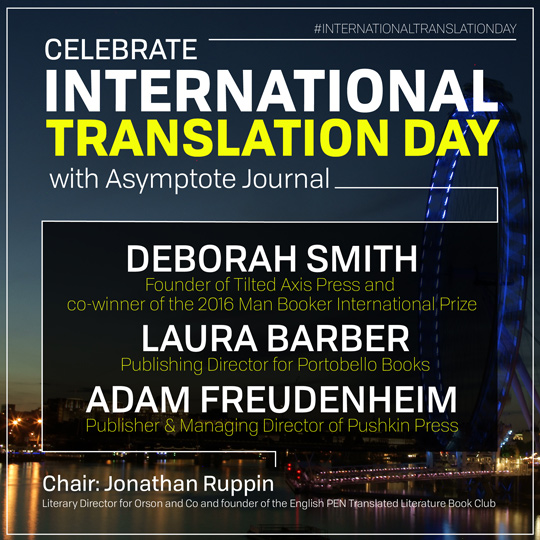Ahead of Asymptote’s celebration of world literature in the UK on September 29th at Waterstones Piccadilly, the founder of the English PEN Translated Literature Book Club—and our event’s chairman—reflects on the last year of reading and publishing literature in translation. Get all of the event details, RSVP to attend, and invite your friends here!
Megan Bradshaw (MB): The title of a recent article from The New Statesman asks, “Translated fiction is not a genre. Why do bookshops tell us it is?” Would you say that giving translated fiction its own category—and a separate Man Booker prize—is counterproductive?
Jonathan Ruppin (JR): I don’t think this is true: it’s almost never shelved separately. But it’s certainly worth pulling out in regular promotions, because this boosts visibility and sales, and there are many readers who are drawn to translated fiction for the broader horizons it offers. The new Booker Prize is doing a wonderful job highlighting the importance and relevance of the novel as a global art form, something that matters a great deal given the safe and parochial nature of what is usually promoted in reviews and in shops.
MB: Last March, the English PEN Translated Literature Book Club tackled Pushkin Press’s reissue of a short story collection by the Russian writer Teffi: Subtly Worded. Many native Russian speakers forewarn that her signature wit will get lost in translation. How did the Book Club receive her?
JR: The book was definitely one of the best-received selections in our first year or so of existence, although everyone seemed to prefer a slightly different selection of the stories. But, more than any other book, we were aware that her intricate use of wordplay had to mean that a lot was lost in translation. But she’s still an extremely rewarding writer to read in English.
MB: A survey commissioned by the Man Booker International Prize found that translated fiction is outselling its English-language counterparts. The same survey also noted that UK sales of Korean books has increased, from 88 copies in 2001, to 10,191 in 2015—many of those sales were for Han Kang’s The Vegetarian, from Portobello. Is the rise of Korean literature here to stay?
JR: That depends almost entirely on whether publishers commit to it. Independent publishers are forging ahead with titles from outside Western Europe, but the bigger companies still rarely do so. And any greater interest in Korean books will come with greater exposure for translated literature overall, or perhaps Asian literature.

